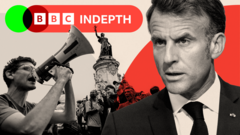France is currently navigating a period of profound national challenges, leading some observers to suggest it risks becoming the new “sick man of Europe.” This concerning assessment arises from the simultaneous convergence of several significant crises, testing the nation’s resilience across multiple domains. Economically, the country grapples with persistent structural issues, including a substantial public debt, challenges to its industrial competitiveness, and an ongoing struggle to generate sustained growth and employment. Socially, France has experienced repeated waves of widespread public discontent and protests, often sparked by government reform initiatives like those targeting the pension system, alongside broader concerns about social cohesion and perceived inequalities. Politically, the landscape has become increasingly fragmented, making it difficult for the government to forge consensus and effectively implement its agenda, leading to parliamentary stalemates and a sense of institutional gridlock.
The historical “sick man” moniker, traditionally applied to nations facing severe internal decay and external pressures, underscores a growing perception of fundamental systemic vulnerabilities within France. This view is fueled by the interplay of economic sluggishness, a strained social contract, and a political environment grappling with deep ideological divides and the rise of populist sentiments. These intertwined factors contribute to an overall sense of national malaise among some analysts and a questioning of the country’s long-term stability and trajectory.
Amidst these complex circumstances, significant debate surrounds the extent to which President Emmanuel Macron’s leadership is responsible for this challenging period. Proponents of his administration argue that Macron inherited many of France’s deep-seated structural problems and is courageously attempting to implement necessary, albeit unpopular, reforms to modernize the economy and social structures. They often point to external factors such as global economic shifts and geopolitical instabilities as contributing elements beyond any single leader’s immediate control. Conversely, critics contend that Macron’s policies have exacerbated social divisions, that his leadership style is perceived as overly centralized or even disconnected from ordinary citizens, and that his reforms have not adequately addressed the root causes of discontent, leading instead to further polarization and an erosion of public trust. The discussion of whether he is responsible for a “shipwreck” or is skillfully navigating a turbulent storm underscores the profound divisions within French society regarding its current state and future direction.



